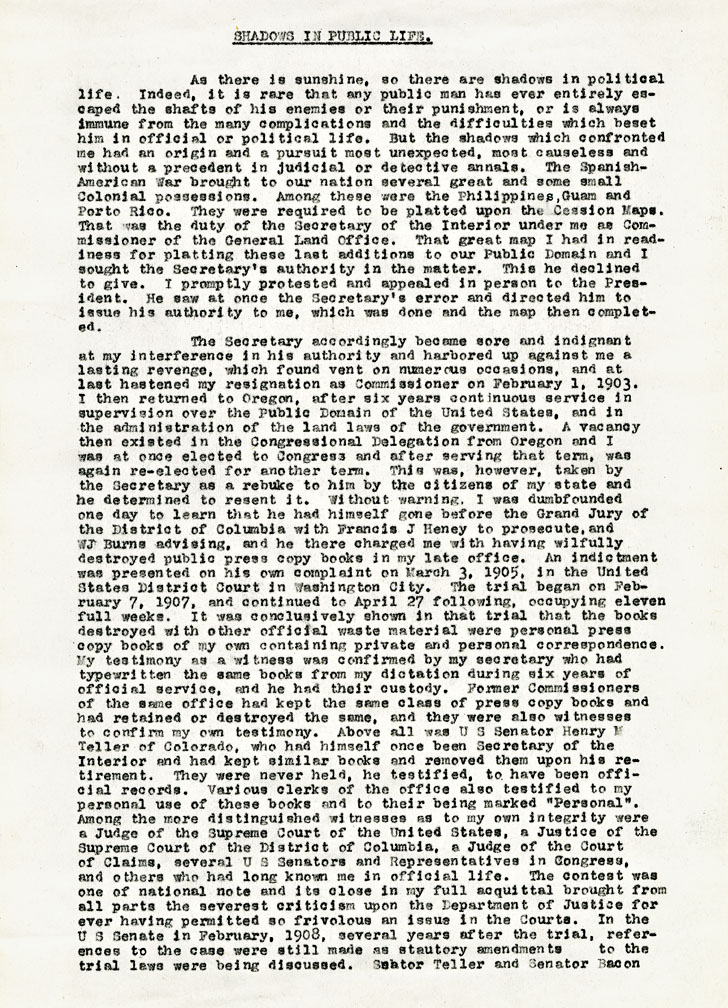- Catalog No. —
- Mss 743; folder 12
- Date —
- 1910s-1920s
- Era —
- 1881-1920 (Industrialization and Progressive Reform), 1921-1949 (Great Depression and World War II)
- Themes —
- Government, Law, and Politics
- Credits —
- Oregon Historical Society
- Regions —
- None
- Author —
- Binger Hermann
Shadows in Public Life
This reminiscence was written by Binger Hermann (1843-1926) in the late 1910s or early 1920s. It presents an insider’s view of the land fraud scandal of the early twentieth century.
Hermann was a prominent Oregonian who served in a variety of public offices, including state representative, state senator, and receiver of the U.S. land office in Roseburg. In 1897 President William McKinley appointed him commissioner of the General Land Office (GLO), the federal agency in charge of administering public lands.
In 1903, after falling into ill favor with Ethan Hitchcock, the Secretary of the Interior, Hermann resigned his position as commissioner of the GLO and returned to Oregon, where he was immediately elected to the U.S. Congress. However, he soon became implicated in the land fraud scandal that afflicted the state during the first decade of the twentieth century. Between 1905 and 1910, Oregon’s national reputation was marred by a series of embarrassing scandals involving political corruption and the illegal acquisition of public lands. Federal prosecutors indicted most of Oregon’s congressional delegation, including Hermann.
In the document above, Hermann describes his first trial, held in February 1907. He was charged with destroying public documents created during his tenure as GLO commissioner, documents that may have contained evidence of his complicity in land fraud schemes. Although found not guilty of this charge, he remained under indictment for alleged collusion in a land fraud deal involving the Blue Mountain Forest Reserve.
Hermann’s second trial was postponed for several years, during which time Oregon’s long-time senator, John H. Mitchell, and the state’s other congressional representative, John N. Williamson, were both convicted of crimes related to land fraud. Finally, in January 1910, the second case against Hermann was brought to trial. The prosecution’s evidence was weak, however, and the case ended in a hung jury. The U.S. District Attorney declined to refile charges.
In the final sections of the reminiscence excerpted here, Hermann writes that soon after the end of his second trial it was discovered that the prosecution had engaged in jury tampering and witness intimidation in some of the other land fraud trials, including the one that convicted Hermann’s colleague in Congress, John Williamson. Williamson’s conviction was overturned by the U.S. Supreme Court, while his fellow defendants were pardoned by President William Taft, who called the actions of the prosecution “the most high-handed outrage that had ever come to his attention.”
Further Reading:
Messing, John. “Public Lands, Politics, and Progressives: The Oregon Land Fraud Trials, 1903-1910.” Pacific Historical Review 35, 1966: 35-66.
O’Callaghan, Jerry A. “Senator Mitchell and the Oregon Land Frauds, 1905.” Pacific Historical Review 21, 1952: 255-261.
Puter, Stephen A. Douglas. Looters of the Public Domain. Portland, Oreg., 1908.
Written by Cain Allen, © Oregon Historical Society, 2006.
